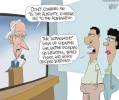Nevada Supreme Court to the rescue – again
At the tail end of the 2011 Legislature, the state seemed headed for a standoff over Gov. Brian Sandoval’s budget. Then the Nevada Supreme Court stepped in.
Justices ruled that “sweeping” money from local funds such as the Clean Water Coalition was an unconstitutional local or special tax, and the state was prohibited from doing it. Suddenly, a $600 million shortfall appeared, Sandoval agreed to extend a package of temporary taxes, and the rest is history.
The court’s ruling averted a partisan standoff and allowed for an 11th-hour compromise. And now the court has done it again.
By upholding the legitimacy of the Nevada State Education Association’s initiative to impose a 2 percent margins tax on businesses, the Supreme Court on Thursday radically changed the terms of the tax debate for the session that’s set to begin Monday. Moreover, the language of the ruling has made things easier for anyone who intends to circulate an initiative in Nevada.
Suddenly, an academic tax debate that was just as likely to end with another stultifying study as it was with real action has become imminently practical: Legislators must either pass the tax plan within the first 40 days or allow it to go on the ballot in 2014.
(Another option, which allows the Legislature to place a competing measure on the 2014 ballot alongside the tax, will also foster debate. This, by the way, is now the most likely scenario: Even lawmakers reluctant to vote for any taxes may see their way to voting to allow voters to decide on a tax plan that may fix some of the problems identified in the teachers union plan.)
Suddenly, Gov. Brian Sandoval’s declaration that he’ll once again extend those temporary taxes – and that no further taxation is necessary – is thrown into doubt. (On the other hand, the governor can’t be very pleased with the idea that thousands of pro-union, pro-tax voters will have a reason to get out to the polls the same year he’s up for re-election. Perhaps it’s time to reconsider that no-tax vow and get this issue off the table as quickly as possible?)
Gary Peck, executive director of the NSEA, says his group will aggressively lobby the Legislature, but he promises a vigorous campaign next year if lawmakers don’t take swift action. He says he’s confident voters will support the measure despite an anticipated campaign against it by business interests.
Speaking of business interests, their arguments against the petition were soundly rejected by Thursday’s unanimous ruling.
The Committee to Protect Nevada Jobs – a coalition of business interests – argued that while the initiative directed the proceeds of the tax be deposited in the state’s schools account, nothing prevented the Legislature from taking money out of that account. The tax could simply be a wash, or even a new source of government spending. The nearly 150,000 voters who signed the petition should have been told that in the 200-word description of effect required for all petitions, they argued. The court disagreed.
“However, the description of effect does not need to explain ‘hypothetical’ effects of an initiative,” the ruling reads. “Instead, a description of effect must identify what the law proposes and how it intends to achieve that proposal, all within a 200-word limit. Given this constraint and in light of its statutory function to facilitate the initiative process, a hyper-technical interpretation of the requirements for a description of effect may impede the people from exercising their constitutional right to propose laws and is therefore an inappropriate method for assessing the adequacy of a description of effect.”
Oh, and another thing: “Given the limited function ascribed to an initiative’s description of effect and the fact that these descriptions are relevant only at the early stages of the initiative process, we conclude that it is inappropriate to parse the meanings of the words and phrases used in a description of effect as closely as we would statutory text. Such exacting scrutiny comes at too high a price in that it carries the risk of depriving the people of Nevada of their constitutional right to propose laws by initiative, something this court has expressly stated that it will not do.”
In other words, trying to keep an initiative petition away from the Legislature or from the voters with spurious challenges to the wording of a description isn’t going to work anymore. If it did, “any opponent of a ballot initiative could identify some perceived effect of an initiative that is not explained by the description of effect, challenge the initiative in district court, and block the people’s right to the initiative process.”
So long as a description is not deceptive or misleading and doesn’t misrepresent the contents of a petition or how that petition will achieve its goals, it will pass muster. And that’s as it should be. You’ll undoubtedly see this case cited in the future to defend petitions from linguistic attacks on their legitimacy.
In the meantime, lawmakers gavel into session at noon Monday with a new item at the top of the agenda, thanks once more to the Nevada Supreme Court and its impeccable sense of timing.
Steve Sebelius is a Review-Journal political columnist and author of the blog SlashPolitics.com. Follow him on Twitter (@SteveSebelius) or reach him at (702) 387-5276 or ssebelius@reviewjournal.com.


















